![]()
The Words of the Seuk Family
|
|
The Words of the Seuk Family |
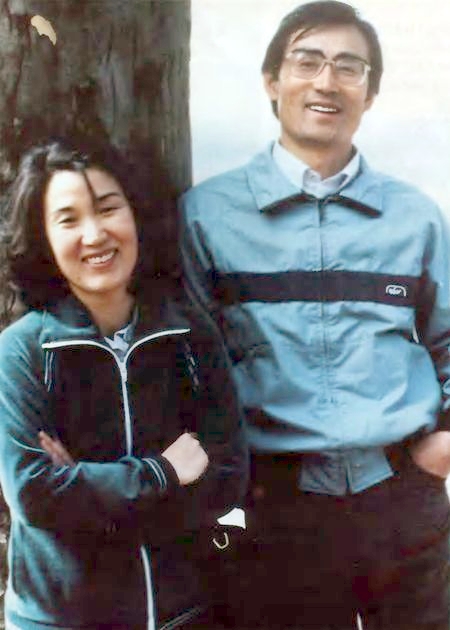
Dr.
Joon Ho Seuk with his wife, Moon Hye Seuk
I was born in 1944, the year of the monkey, the same as Father. I was also born in the same month as Father: January, according to the lunar calendar.
In 1944 Korea was not a free country but was occupied by the Japanese. I was born in what is now North Korea, in the town of Ham Hung, which is very close to Hungnam where Father was imprisoned. After the liberation from Japanese dominion my family moved south to Seoul.
When I was six, the Korean War broke out, on June 25, 1950. Millions of people were slaughtered by North Korean communists. My family barely escaped being killed. At that time my mother, Mrs. Won Pok Choi, was in the United States as an exchange professor. She didn't know if her family was alive or dead. She had nightmares all the time. The North Koreans forced all the young people into the army. They would come to people's houses to investigate and would torture anyone caught outside. My father fled into the mountains and lived there for several months. My brothers and I hid at my uncle's house in the countryside. We stayed in the basement, trembling in fear of being bombed. There was nothing to eat -- no rice, no kimchee.
On September 18, 1950, the UN forces advanced into North Korea, and on October 4 Father was liberated from Hungnam prison. On January 4, 1951, all the South Korean and UN forces retreated. My family fled south to Pusan, and there we led a refugee life until 1953 when the armistice was signed and we could return to Seoul.
When Father was liberated from Hungnam he also fled to Pusan and started the Unification Church there under miserable wartime circumstances. In 1953, Father came to Seoul and began to preach there. The spiritual world actively helped by bringing many people to hear Father. Terrible rumors were also fabricated at that time, and the Korean government began to persecute the Unification Church. However, many college students started coming to the church, especially from Ehwa Women's University and Yonsei University.
The school administrations were worried and sent many respected professors to investigate. One was Dr. Young Oon Kim, a very eminent scholar. After she heard the Principle, she was deeply inspired and she joined. Another professor was my mother, who was the dean of student affairs in the Law and Government School of Ehwa University. The president of the university also sent her to investigate the church and "save" the students. But on the contrary, she was touched by the truth and joined.
The vice president of Ehwa University was the wife of the vice president of the Korean government. She pushed the government to go against Father. Under those circumstances, my physical father misunderstood the Unification Church and began to oppose my mother's joining it. Until this happened, we had had a very happy family that everybody had envied. All of a sudden, my family began to break apart.
My mother was desperate to explain to us about her involvement with the church, but we could not understand her at all. The conflict between my father and mother deepened. Every night I had nightmares that dark clouds were sweeping around the house to swallow us up. I used to scream in fear and wake up. This was Satan's attack on our family to prevent my mother from joining the movement.
All of a sudden, my mother left one day without telling me. I neither saw nor heard from my mother for 10 years after that, until I myself joined the Unification Church. Her leaving the family was a terrible blow. At that time, divorce was very rare in Korean society. The Confucian ethics respecting family values were pervasive. The idea of the breakup of our family was unthinkable to me.
My character had always been joyful and aggressive, but from that time I became very reserved. I tried to forget my mother. I concentrated only on my school work and martial arts. I studied martial arts so hard that I forgot everything else. My father was the most famous martial arts educator in Korea as well as a professor and a graduate of law school. When I was in high school I was at the top in martial arts and was very strong physically among all the high school students. But when I was about to enter college I received an injury which developed into pleurisy. It was a life-threatening disease and I had to give up school.
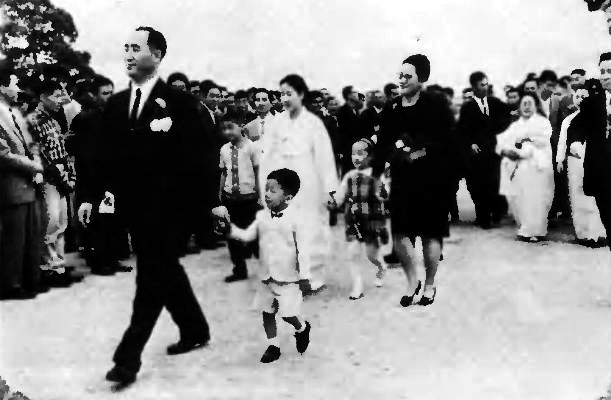
Father
at Kimpo Airport on October 10, 1965, upon his return from his first
world tour.
I began to think about what life meant. I felt very desperate to try to find meaning in my life. I read many books about philosophy and religion and I visited many churches and Buddhist temples to find the answer. Then one day I asked myself why my mother had left us to join the Unification Church. I felt I had to find that church. In fact, it was only a 15-minute drive from where I was living, although I didn't know it at the time. So I started my search by visiting my mother's brother. He was surprised that I had never visited her. He told me to go to Myung Dong (comparable to Broadway in New York) to a place where many young women were witnessing to people and inviting them to hear lectures. That was the Unification Church lecture hall. So I went to Myung Dong and found many sisters distributing leaflets there. One of them approached me and brought me in to listen to the lectures. Lectures were given every day and hundreds of people came to hear them.
When I heard the lectures I was really amazed. I had heard all sorts of bad things about the Unification Church, and I even thought my mother was the worst kind of woman. But here I found something very inspiring and profound.
The series of lectures lasted one week. One day as I was coming out of the lecture hall onto the street, I encountered my father. He was so shocked. "Do you know what this place is?" he said. "This is the Unification Church. It is dirtier than a house of prostitutes:' He really got angry. I told him I was just visiting the center but that I didn't want to join. I said I would never betray him.
After three months of study I reached the conclusion that the Principle was true, and I made up my mind to join. It was a very serious moment for me. Should I betray my father or not? I decided to change my name to my mother's last name so my father would not hear that I had joined. That was in September 1965.
At that time True Father was making a world tour, establishing holy grounds. In 40 days he established holy grounds in every state in America. Father drove day and night from state to state, eating hamburgers and hot dogs in the car. He brought rocks and earth from the holy ground in Korea to connect all the new holy grounds. When he arrived back in Korea, I went to see Father at the airport. My mother was with him, but I couldn't approach them because there were so many family members who had come to welcome Father. Several days later I finally met my mother face to face at my grandmother's house. It was our first reunion after 10 years of separation, and it was a very emotional and moving moment.
One amazing thing my mother told me was that when she was with Father on their way back to Korea, some place in the Philippines, Father suddenly asked her if she had ever contacted her children. My mother was very surprised to hear this question from Father because Father had never before asked about her husband or children. My mother answered, "Since I left my family I haven't seen or heard from them in 10 years:" Then Father told her, "Now the time has come when one of your children will join." That was the same time that I had begun listening to the Principle. If I had had good health I probably would never have become a church member. After my suffering, heavenly blessing had been given to me.
After I became a member, I studied the Principle more and more seriously and started to go to the Sunday services. Before, I had never gone out on Sunday mornings. But all of a sudden I began to go to the church very early in the morning and also to the regular Sunday service. Usually Father gave Sunday morning service at six, right after five o'clock pledge. During regular Sunday service Father knelt down in the back, listening to the sermons that his disciples would give.
On the first day of every month, Father used to go right after pledge to the holy ground on the mountain in the center of Seoul. It took about 40 minutes to climb up the mountain, and every family member would go, even in the snow. We would gather together at six and everybody would pray. Then Father would give a short sermon. Even if it was raining or snowing, Father would always speak.
At that time I was still living with my father; I could not attend church freely or witness freely. I didn't want to "betray" my father and give more pain to him. I wanted to hide myself. On Sunday mornings I always went out of the house quietly so I wouldn't wake him up. I opened the door without making any noise so I could slip away, but he became suspicious. He woke up early one morning to watch me.
Then my father began to realize I was actually attending the Unification Church. Because of his attitude I was not free, so I decided to join the army. All Korean young people had to serve in the army for three years. At that time the Vietnam War was going on, and many Korean soldiers were dispatched to Vietnam. I volunteered to go to Vietnam, externally as a Korean soldier, but internally as a Unification Church missionary to represent Father.
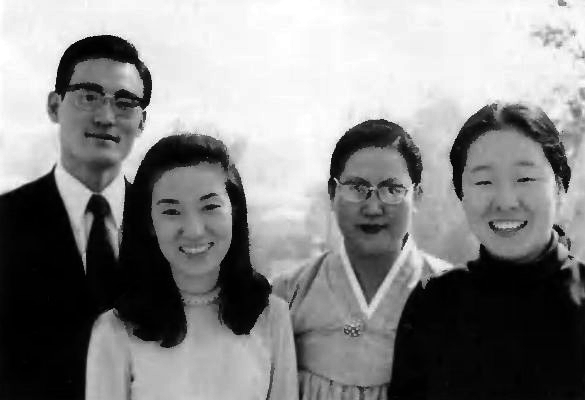
From
left to right: Dr. Seuk; his wife, Moon Hye; his mother, Mrs. Won Pok
Choi; and True Mother.
During the eight-hour flight there, I prayed all the way that I would never regret going there even if I got killed. I was very serious about my mission, because I didn't know if I would come back alive or not. Thousands of Korean soldiers were killed in Vietnam. I felt I had to devote myself 100 percent to God's will even though I might die at any moment.
I taught martial arts to Vietnamese and American servicemen at the Vietnamese National Military Academy. I also contacted civilians, but it was very dangerous because there were many Vietcong and there was no clear front line. The Vietcong disguised themselves in every way.
Sometimes I visited mountain tribes whose people spoke a different language, so I would go with a Vietnamese minister who translated for me. I could even contact many high- ranking people through my martial arts instruction. Two of my many contacts even visited Korea later to meet Father, but now that Vietnam has become communist, I don't know where they are.
During my stay in Vietnam, one of my friends went back temporarily to Korea and met my father. Without understanding my situation, he reported to my father that I was teaching the Principle and witnessing to Vietnamese and American people, and that my main activity in Vietnam was actually witnessing. My father was extremely disturbed to hear this.
When I came back to Korea my father was very suspicious. So I told him emphatically, "Don't worry about me. I will never betray you." Finally, however, he found out that I was still attending the church. I could not tell him a lie anymore, so I told him straight out: "I am a member of the Unification Church." My father was really flabbergasted -- he almost fainted. His features became very contorted and the blood came up to his face. After that, whenever my father looked at me he became sick. His physical condition deteriorated just by seeing me. My stepmother advised me not to stay in the house or else my father would die. She also talked with my father and he decided that if I was a church member I could not stay at home.
One day soon after that my father prepared a special dinner for me -- all my favorite foods. He began to cry as he offered the food to me. He said, "Your mother has betrayed me, and now you have betrayed me. I love you both so much, but I have been betrayed." He cried and cried. Then he said, "You are leaving me now. I hope you have good luck and much success." He sent my stepbrother, whom I love very much, to see me off My brother was weeping, saying that he was so sad that his elder brother was leaving him.
I went to stay at my grandmother's house. I became very serious in my determination. I had betrayed my father so now I wanted to start a new life. From that time on I seriously thought about my goals, and I determined to devote myself 100 percent to God's will. Otherwise I could not justify betraying my father.
My first plan was to study the Principle thoroughly. I began to study intensively from early in the morning to late at night without leaving my chair. Whenever my grandmother came into the room to bring me cake or fruit, she would only see my back. She began to complain that I wouldn't even turn around to greet her. For two or three months I studied like this. Then the Principle test was held.
In Korea we have national Principle tests every year. Only a few people could pass the test; sometimes nobody could. It was a very difficult test but I got the highest grade.
In the secular world many people study very hard to become doctors or lawyers. In Korea some people even go to a temple or a mountaintop for two or three years just to prepare for a bar exam! Then what should our standard be towards the Principle, which can bring eternal life to all humankind?
I also volunteered for everything, humbly, to enlighten myself and enrich my experiences. I didn't want to become a leader until I was fully prepared. I felt unworthy to be a leader. I needed training and experience, so I volunteered to be a follower in a humble position. I was a pioneer in a small town for a while, but I returned to Seoul in 1970 and became a Principle lecturer at a local church center.
In 1970 the 777 Blessing took place. I thought I was unworthy, so I didn't attend the matching candidates' meeting, which was being held in the old Chung Pa Dong Church. Two days later, Father asked me to participate; so I came in at the very end.
That evening, Father finished matching around 10 p.m. and went up to his room, which was attached to the side of the church building. He used to live in a very humble and small place, even though he and Mother already had many children.
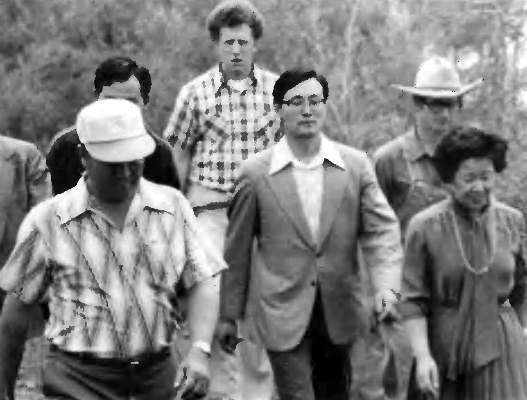
Around two a.m. Father came back down. It was a very exciting moment. Right away, Father pointed to me and I stood up. He looked at all the sisters and chose a very nice sister for me. The sister and I went out into the hallway and spoke for about one minute. We didn't have to talk much; we had absolute faith in Father's recommendation. We went back in and bowed to Father -- the match was set.
The Blessing was held in Janchoon Gymnasium on October 21, 1970. Our couple stood at the front of the third row. Mr. Salonen and his wife were next to us. During the ceremony, Mrs. Salonen collapsed because she was so tired and nervous. The cameras zoomed in on her, and our picture was also taken. That evening, my physical father saw my Blessing on TV. I heard that he was really shocked. He hadn't known where I was, then all of a sudden he saw me on TV with my bride, in our wedding apparel, getting married without his knowledge or approval.
Right after the Blessing, I volunteered to be a local center leader in a small town near the 38th parallel. The blessed wives' team captain at our center was Mrs. Tiger Park. She already had four sons at that time, and had just given birth to their fifth child three months earlier. An American military base was located in that town. Many prostitutes hung around that base, and some of them even lived across the street from our center. It was the worst kind of city, but I wanted to challenge it. The holy ground was located high up on a hill, overlooking the whole city. We would go to the holy ground for prayer at five o'clock every morning, no matter what the weather.
After that mission, I came back to Seoul to become regional director of CARP in the Saemaul Haksa region. In February 1972 I came to the United States and participated in Father's first seven-city tour. During Father's public speeches, I sat next to Mother. It was really an unforgettable blessing for me. I felt immense warmth and personal love from her.
After this experience, I was given the mission to check and correct the contents of the English Divine Principle transcription (the original black book), which was first translated into English by my mother. We had hired someone from outside the family to correct the English, but because he didn't know the Principle at all, his corrections caused some substantial changes in the contents. I had to check every single word in the whole book.
In 1978 I became a CARP advisor in Washington DC. One year later Father gave me a new mission at the Unification Theological Seminary. I became an assistant to the president, and treasurer as well. I endeavored to establish Father's tradition at the seminary, and I conveyed every speech of Father to the seminarians. While there I got the inspiration to found a new unified martial art, Wonhwa-do.
I sought to incorporate in it the best of all martial arts, centering on Unificationism.
On January 2, 1983, Father gave me another mission -- I was to be the national director of CARP. I never thought I would receive such a responsible mission. I felt that I was not ready, that I needed more training at the seminary. My physical condition was not good. During my life at the seminary, I had lost almost 20 pounds, and my back and stomach were becoming weaker. I had to keep a special diet. I made every effort to improve my health, but all my efforts were in vain. I was afraid I had cancer. I went to see a lot of doctors and took many tests, but they could not find anything. My health has not improved even today. I have become very serious and I often think, "If I have cancer and die, what will be the meaning and value of my life? Have I made a strong enough commitment to God? Have I done my best? Have I lived the kind of life that I will not regret?"
Father gave me this CARP mission even though he knew my health problem. I received the inspiration that Heavenly Father would give me good health if I really committed my life 100 percent to Him and to His will. If I receive good health, I know it doesn't belong to me, but to God. If I don't use my good health for Him, my health will eventually deteriorate. Through this, I know Heavenly Father wants me to become more serious. So now I have no choice -- I must either commit myself 100 percent, or die.
In 1974 my physical father visited me for the first time since I had left home. He met my wife and liked her very much. He began to change his concepts about our church. When he went back to Korea, he praised my wife to his friends, saying, "Even though she is a Unification Church member, she is a really wonderful daughter-in-law. I like her very much:' He visited us again in 1979, to see my children. At that point he changed completely and became positive about the church. I testified about Father and our movement to him. He even stayed in the World Mission Center and had dinner with Rev. Kwak.
After watching a videotape on the science conference, he said "Rev. Moon is really a remarkable person. I respect him very much." My elder brother signed membership, and my younger brother also became supportive. In Moses' course, we can see that before God gave blessings to Moses and the Israelites, He gave them trials and hardships in order to separate them from Satan and prevent Satan's accusation. I know if I invest myself with utter sincerity for Heavenly Father, the spirit world can be mobilized and help us. In my house there is a plaque with Father's calligraphy written on May 1, 1975, that says: "Utmost sincerity moves Heaven." That is my personal motto.
Heavenly Father sends trials and sufferings before He sends blessings. We should overcome any difficulties with a grateful heart and absolute faith in God. I want to become a frontline soldier for God, even willing to give my life to do His will. When I die, I want to die without any regret.
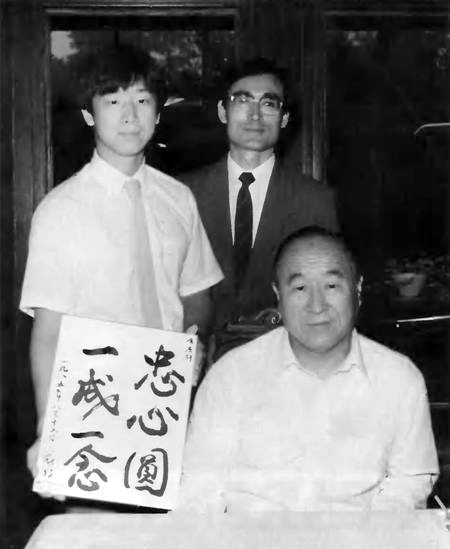
Hyo
Nim, standing beside Father and Dr. Seuk at East Garden, displays the
message Father wrote in calligraphy for CARP on the Day of Victory of
Love in 1985.
A few years ago when Heung Jin Nim had the accident and was in critical condition, I visited Father and Mother at the hospital. They had just come from Korea. Mother was crying and the atmosphere in the room was very somber and heavy. But when Father saw me he said, "Oh, CARP has come! How are the CARP members?" That was Father's first greeting to me. Even under those serious circumstances, he had a deep heart of love and care for the members.
On October 25, 1985, I visited Father at Danbury prison and spoke with him for six hours. I had never spoken to him in such an intimate setting before. There was a little table in the visiting area where we could talk face to face. I was speaking with Father so closely he could probably smell the kimchee on my breath.
Father even sent me a personal letter from Danbury, with his own signature. He wrote down the three major areas of responsibility for CARP and for myself. Through this I could feel Father's great concern for CARP.
One day in May 1984, Mother invited me to go on a drive with her to visit the beautiful Mt. Holyoke campus where Un Jin Nim would be attending school that autumn. Upon our return, we stopped somewhere to eat. I was preparing to order for Mother and myself but she told me "Oh, I will order for you." She didn't even ask what I wanted but just went ahead and ordered for me. While we were eating, Mother asked me many things about my, family and children. Then she asked, 'Have you ever fought with your wife?" I told her "Yes, Mother, sometimes." "Who wins?" she asked. I answered, "I always lose." Mother smiled, and I felt Mother's deep compassion.
After that, Mother took me to a department store and bought two summer suits; one was meant for me and one for Father. Except for the size they were identical. I knew this was an expression of Mother's love not for just me but symbolically for all the members.
In CARP my motto is: "Advance Father's plan." This means that CARP should do things before receiving any direction, and do even more than True Parents expect.